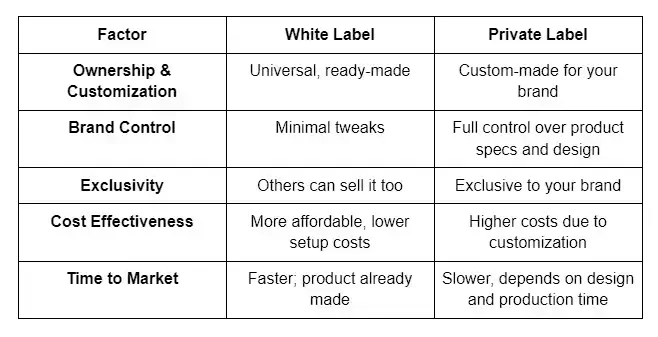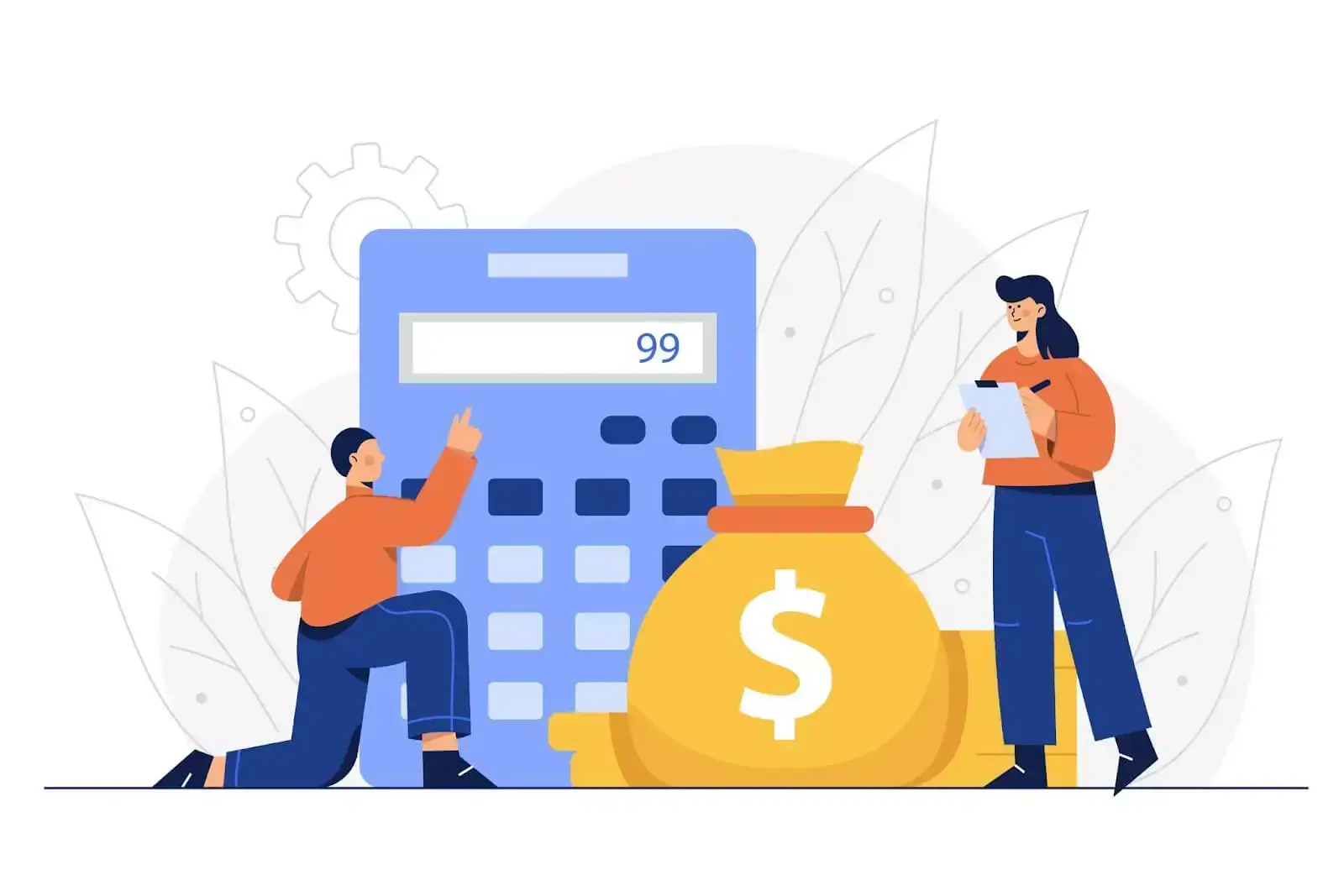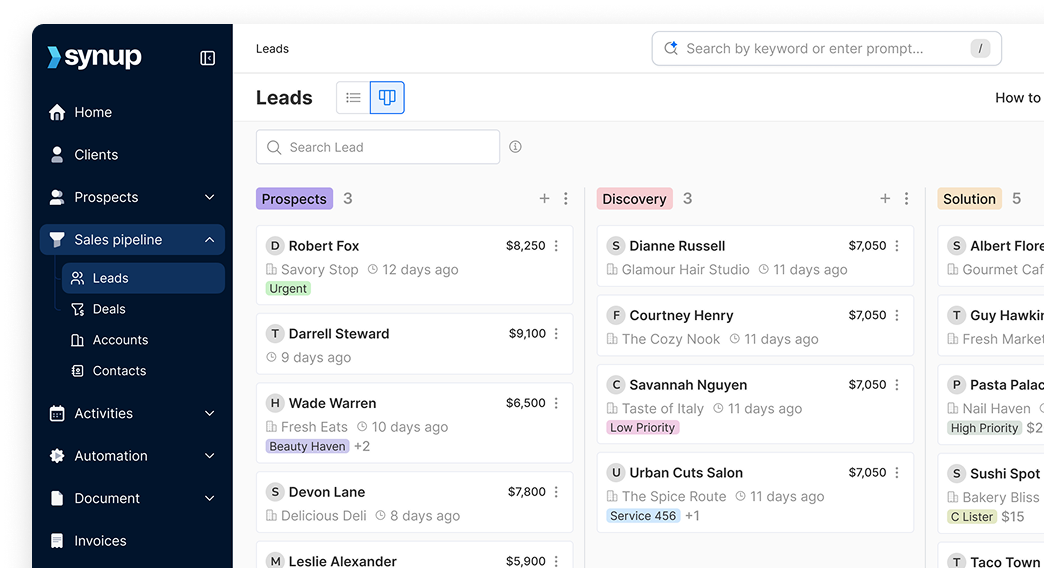White Label or Private Label: What's the Difference?
Curious about white label vs. private label? Discover the key differences and insights tailored for agencies and entrepreneurs.

Valued at $742 billion in 2022 (according to Yahoo Finance), white-label and private-label products continue to take the spotlight.
It’s not hard to see why.
They provide businesses with a quicker route to market without the need to reinvent the wheel or start from scratch.
But what's the difference between white label vs private label products? Or is there any distinction at all?
White label products are essentially ready-made and can be branded with any label. Private labels, on the other hand, focus on customizing products specifically for your brand.
Still scratching your head? No worries, we’re about to break it down. Let’s explore what each term means and which is the perfect match for your business!
What are White Label Products?
White label products are pre-made products created by one company, rebranded and sold by another as their own.
They are “ready-to-go” products you order from a manufacturer or software developer. They’re already crafted and functional, just waiting for a brand to slap its logo on them. For example, with Synup, a white-label local marketing tool, you can extend your marketing offerings to clients under your own brand name.
A developer produces the product, and businesses like yours purchase it, add your branding, and sell it as if it’s entirely yours. It’s similar to store-bought OEM electronics—the same product, different labels.
White label is fast, simple, and allows your business to gain visibility without the hassle.
What are Private Label Products?
Private label products are goods created by one company specifically for another company to brand and sell. The purchasing company controls the branding, while the manufacturer focuses on designing the product.
Here's the simpler way to explain it:
It’s like designing your own video game character. You control the character’s appearance, gear, and theme, but the game engine—built by someone else—handles the technical side. For example, a business might create a customer support platform that looks and feels unique to its brand, but behind the scenes, another company provides the engine that powers it.
In short, you get full control over the product’s appearance and brand identity while letting someone else handle the engineering and manufacturing. Pretty cool, right?
Key Differences Between White Label and Private Label
White label and private label products may often seem similar but they have a clear line of difference. Let’s take a look at white-label vs private-label products.

Here’s a detailed comparison that highlights the key differences between private label vs white label products.
1. Ownership and Customization
White-label products are pre-built and ready for anyone to brand, own, and sell. You receive the product as is but with somewhat limited customization. In return, much of the legwork has been completed for you.

In contrast, with private label products, the products are made exclusively from scratch for the company that placed an order for them. Everything else, from the branding to the actual manufacturing or engineering, is customized for the requesting company. You have control over every single aspect.
2. Brand Control
This is another integral point of difference between white label and private label.
White-label contracts offer some branding, and it tends not to be uncomplicated. In most cases, you simply add your logo, and that’s about it. Private-label products may require significantly more input.
As an agency or SaaS company, you don’t have to worry about creating the product. You may partner with a white-label provider like Synup and focus solely on branding.
On the other hand, a private label puts you in the driver’s seat. You must exercise control over the product’s look, feel, and specifications.
3. Exclusivity
With white label products, you’re typically not the only one selling the product. The white label brand has many other companies and agencies it's making the same products for.
So, others can monogram or edit brand identity on the same thing. With private label products, no one else can sell that product because it's your idea from scratch. The product developer is just helping with execution.
4. Cost Effectiveness
White label’s the cheaper option, hands down. Your setup costs are lower since the product is already made and you're not spending on product development.
Private-label products, on the other hand, come with a higher price tag. You’re paying for all that customization and exclusivity.
5. Time to Market
White-label products can hit the market fast. No waiting around for production; just rebrand or integrate, and you’re good to go.
On the other hand, private labels take more time. You’ve got to wait for your custom design to be made, which can slow things down.
That’s why it depends on your need—speed or control.
Key Similarities Between White Label and Private Label Products
White and private labels have some key similarities. Here’s a breakdown:
Third-party Development
Both white label and private label products come from a third-party company that makes the product or service.
In other words, as the agency or client company, you’re not responsible for making the product—you’re simply branding or claiming it. You’re essentially outsourcing the hard work, allowing you to focus on marketing and growing your brand.
No Capital Investment
This means you don’t need to hire a team to develop your product, making it ideal for sole proprietors or startups.
Whether you choose white label or private label, someone else manages the product development. All you need to do is focus on branding and marketing. For instance, it’s like buying a car and customizing it to your style rather than building the car from scratch.
(Somewhat) Similar Concept
Both options give you:
- A product development firm
- The chance to offer products without the upfront investment in production.
Whether you’re going for a white label product’s faster route or a private label’s tailored approach, the big benefit is the same. You save money and time on production!
Focus on What Matters Most—Your Brand
Both options allow you to focus on marketing, customer experience, and growing your business without stressing over development issues. In other words, it’s all about making things easier for you while still delivering products your customers love.
So, what’s the benefit? Both white label and private label help you scale faster and smarter. It's a win for any business!
How to Choose Between White Label vs Private Label Products
Are you confused between choosing white label and private label products? No need to worry! Let’s break down the argument for white label vs private label, based on what matters most.
Branding
If your brand is your pride and you want full control over its appearance, opt for a private label product. This approach allows you to customize every detail, making the product feel uniquely yours. In contrast, a white label product is more about purchasing an existing product and simply adding your logo.
For instance, if you’re launching a customer management platform and want full control over how it works, a private label is the way to go. You can execute the UI and UX as per your vision.
However, if you're comfortable adding your brand details to a pre-made product, a white-label product can work as well—like taking a solid pre-built platform and just adding your logo and brand name. Both options have their merits; it just depends on what you want!
Customization Needs
Here’s the thing: with white label, everything is ready to go. You’re getting a pre-made physical or SaaS product, making it a quick and hassle-free solution. No need to worry about development—it’s all set for you.
Private labels, however, allow you to customize everything—features, user interface, integration—whatever fits your vision. If customization is key, a private label is your best option.
For example, if you’re launching a project management tool and want to align it with your team’s workflow—custom dashboards, unique features—a private label lets you control these details.
White label products, on the other hand, is like grabbing a pre-baked cake; you can add toppings and frosting (i.e., your branding), but you can’t change the cake itself.
Budget
If you’re a startup with limited funds, white label products can be a smart choice. It’s like buying wholesale t-shirts—you save money because they’re already produced in large quantities, making it a cost-effective option.

On the other hand, a private label product is like ordering custom t-shirts with your unique design. While it costs more because it’s tailored specifically for you, white label allows you to get started without breaking the bank.
Time to Market
Did you need your product out so quickly that it felt like it was due yesterday? White-label products are the way to go. Since they’re pre-made, you can integrate your branding and start selling in no time. Private labels take longer because you have to wait for production, making it less immediate. White-label allows for a quicker launch since the products are already available.
Summing Up
White label products are faster and more cost-effective, while private label options offer complete control. The decision hinges on the level of customization you require, your desired launch speed, and your budget.
Here’s the deal: if you're looking to boost revenue without the hassle, tools like Synup offer excellent white label services. You can resell their digital marketing tools under your brand, helping your business scale quickly.
So, what’s the benefit? You gain access to quality products without the need to start from scratch.
If you’re ready to get started, you can book a demo with Synup and get a better idea of the benefits.
White Label or Private Label: What's the Difference?: FAQs
What are the 4 types of private labels?
There are several types of private label products: generic, copycat, premium, and value innovator labels.
First up, generic private labels are the everyday options—basic and budget-friendly. Copycat private labels imitate popular brands but at a lower price point. Then, there are premium private labels, which offer high-end quality for those seeking top-notch products. Finally, value innovator private labels introduce something fresh and unique, standing out from the crowd with innovative features.
Is a white label the same as a private label?
While they are often used interchangeably, there are several differences between white label vs private label products. White label products are pre-made and rebranded, whereas private label products are customized specifically for your brand.




